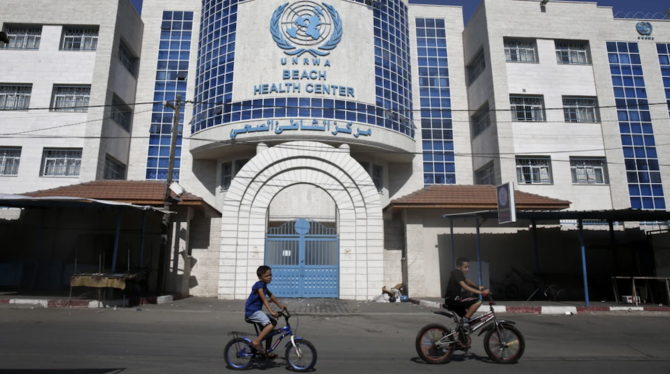NEW YORK: The United Nations Relief and Works Agency for Palestine Refugees in the Near East is going through a “massive” financial crisis that threatens its very existence, the agency’s chief has warned.
Philippe Lazzarini said that UNRWA’s ability to “muddle through is slowly but surely coming to an end,” and predicted that by September it will have no cash to keep its schools, health centers and other critical services running.
Lazzarini was speaking in New York ahead of a pledging conference on Friday to support UNRWA organized by Csaba Korosi, president of the General Assembly.
The UNRWA chief said the agency is “about to implode,” lamenting the fact that even as the financial crisis deepens, some of its most committed donors have indicated they will “substantially decrease their contribution to the agency.”
He called on donors to “not take our ability to deliver services for granted,” adding that “sooner or later, we will reach a tipping point.”
UNRWA provides services to almost 6 million Palestinians registered in the occupied Palestinian territories and neighboring countries.
“I keep telling partners that UNRWA is not like any other UN humanitarian or development agency,” Lazzarini said.
“(The) uniqueness in this organization is that we are the only ones who are tasked to provide government-like services. We are, de facto, the ministry of education, the ministry of primary healthcare, the ministry of social services and the ministry of municipal services to one of the most destitute communities in the region — Palestine refugees.
“So, when we talk about adapting spending to resources, I am in no position to say, ‘Well, because we have 20 percent less resources, let’s ask 20 percent of our children to leave our schools.’ Based on which criteria? We have nearly 550,000 girls and boys in our schools. I cannot one year say that I will take 550,000 students and another year say I will take 100,000 students less and bring them back once the funding returns. That is not the way public-like services operate,” he said.
The agency has about 30,000 staff, most of them Palestinian refugees. It runs more than 700 schools for half a million children, and offers health, sanitation and social services, including food and cash assistance.
Palestinian refugees mostly live in often underserved camps that have been transformed into built-up residential areas in the occupied territories, as well as in Jordan, Syria and Lebanon.
Lazzarini said that over the past 10 years the agency’s resources have stagnated, while costs have increased in a region that has been hit by multiple crises.
“Expectations from Palestine refugees vis-a-vis UNRWA as being the only lifeline have also increased. (So) the tension between the costs and the resources has become more and more unbearable,” he said.
In the absence of a political process and in a context where the Palestinian-Israeli conflict “is not a priority anymore,” any decrease in UNRWA’s services would be perceived “as a weakening of the future rights of Palestine refugees,” Lazzarini said.
He urged donors to show “genuine political attention and commitment.”
Lazzarini told Arab News that UNRWA’s approaching 75th anniversary is a “perfect umbrella” to reflect on what it means to be committed to Palestinian refugees.
“This is a discussion that has not really taken place,” he said, adding that since he took up the post as commissioner-general there has been a “dialogue of the deaf” between host communities and donors.
“The donors usually tell you that you have to spend within your resource, but we keep saying, ‘Well, there is a limit to that. We have been involved in efficiency. It became austerity. And, today, going further would mean taking the decision to ask kids (to) be dropped from high school. This is something we cannot do.
“So, we need to have a proper discussion about what do we expect an agency like UNRWA to deliver, and once we agree on (that,) we become a predictable partner for the Palestinian refugees,” he said.
“This discussion has not yet taken place because there hasn’t been a political framework. But we as an agency cannot wait. Our worst enemy today is a status quo, and I’m looking at how to force a discussion, how a group of experts can come up with recommendations to be brought on the table and to be agreed with member states.”
In a statement to the pledging conference, UN Secretary-General Antonio Guterres said that UNRWA’s financial crisis comes against the backdrop of the deadliest year for Palestinians in about two decades.
Guterres expressed regret at not being able to attend the conference in person after he was called home to Lisbon because of a family emergency.
“Halfway into the new year, violence rages on without reprieve,” said Chef de Cabinet Courtenay Rattray, who spoke at the pledging conference on behalf of Guterres.
He reiterated the UN position that “there is no alternative to a political solution that realizes the vision of two states — Israel and Palestine — living side by side in peace and security, with Jerusalem the capital of both.
“The outlines of this solution are well known: They are laid out in United Nations resolutions, international law and bilateral agreements. But realities on the ground — from the continuing occupation to expanding settlement construction — are working against us.”
Rattray said that “in this darkening picture, UNRWA is one of the few rays of hope,” and urged member states “to nurture and sustain this hope,” and do their part to “ensure that UNRWA is fully funded.”
























